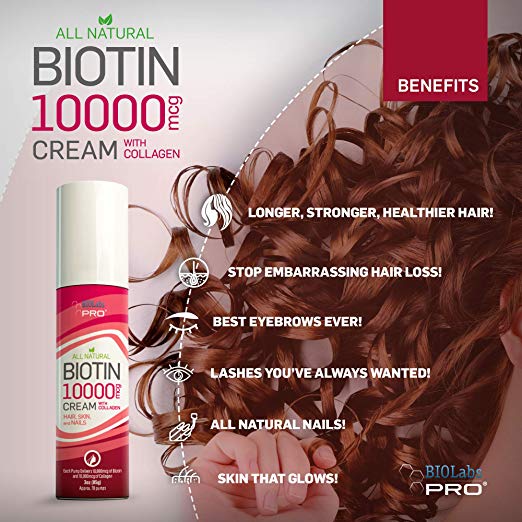What Biotin Can Do For You
Biotin, also known as vitamin H or B7, is a water-soluble B complex vitamin that helps converts food into energy. B vitamins such as biotin help keep your hair, skin, and nails healthy. It’s also an essential nutrient during pregnancy by promoting embryonic growth. Most people receive biotin through a nutritious diet, but some claim that additional biotin can balance blood sugar, help pregnant moms have stronger babies, and boost hair, skin, and nail strength and quality.
This brings up the question of, what can biotin do for you?
Diabetes
Some research shows that biotin supplements may regulate blood sugar levels for men and women with type 2 diabetes. It may also prevent kidney damage for those with insulin-dependent type 1 diabetes.
Healthy hair, skin & nails
While having a biotin deficiency isn’t common, low levels may cause hair loss and a scaly rash. More studies need to be done on the efficacy of biotin supplementation, but since biotin helps promote healthy hair, skin, and nails, adding more to your diet might help.
Fetal development
When pregnant, ask your doctor about taking a prenatal vitamin with folic acid and biotin. Research shows that folic acid reduces preterm labor and prevents birth defects. While a biotin deficiency is rare during pregnancy, taking a low dose in your prenatal vitamin should be safe. Ask your doctor for additional information.
Multiple Sclerosis
Early research shows that biotin may reduce partial paralysis and vision loss for those with multiple sclerosis.
Weight loss
Some evidence supports that biotin helps men and women maintain a healthy weight and promotes healthy weight loss.
What is the recommended daily allowance?
The usual recommended dose of biotin is 30-100 micrograms (mcg) per day for adolescents and adults. Due to biotin’s water solubility, some will pass through your urine each day. Even though most people can handle biotin supplements, some adverse symptoms might include nausea and digestive problems.
What are the natural sources of biotin?
Food processing and cooking tends to weaken vitamins such as biotin. Eating fruits and vegetables in their natural state increases vitamin intake. Biotin is naturally found in the following foods, including:
- Whole grains and cereals
- Egg yolks
- Bananas
- Mushrooms
- Nuts (almonds, pecans, walnuts, and peanuts)
- Nut butters
- Soybeans
- Organ meats (liver and kidney)
Where can I find a biotin supplement?
Sometimes you can’t get enough biotin from a healthy diet and need a supplement to treat or prevent a biotin deficiency. Supplements are not monitored by the U.S. Food and Drug Administration for quality or safety, so it’s important you choose a brand you trust.
Biotin creams are easy to apply and last a long time. Look for creams made in an FDA approved facility, come without parabens and sulfates, and with natural ingredients. Capsules or tablets can be hard to swallow and may not be as effective.
If you’re experiencing painful symptoms connected to low levels of biotin, then additional biotin may help improve the quality of your life.
If you enjoyed this article it would mean a lot to us if you would share it... :)
Click the share button below to help grow the Smarter Health™ family!
(n.d.). Retrieved from https://www.nrcresearchpress.com/doi/abs/10.1139/cjpp-2014-0479#.XPqTflxKg2y
Biotin (Oral Route) Description and Brand Names. (2019, February 01). Retrieved from https://www.mayoclinic.org/drugs-supplements/biotin-oral-route/description/drg-20062359
Biotin: Uses, Side Effects, Interactions, Dosage, and Warning. (n.d.). Retrieved from https://www.webmd.com/vitamins/ai/ingredientmono-313/biotin
M, D. (2014, October 15). Adequate Intake of Biotin in Pregnancy: Why Bother? Retrieved from https://academic.oup.com/jn/article/144/12/1885/4575066
Understanding Digestion Problems: GERD, IBD, and More. (n.d.). Retrieved from https://www.healthline.com/health/digestion-problems



